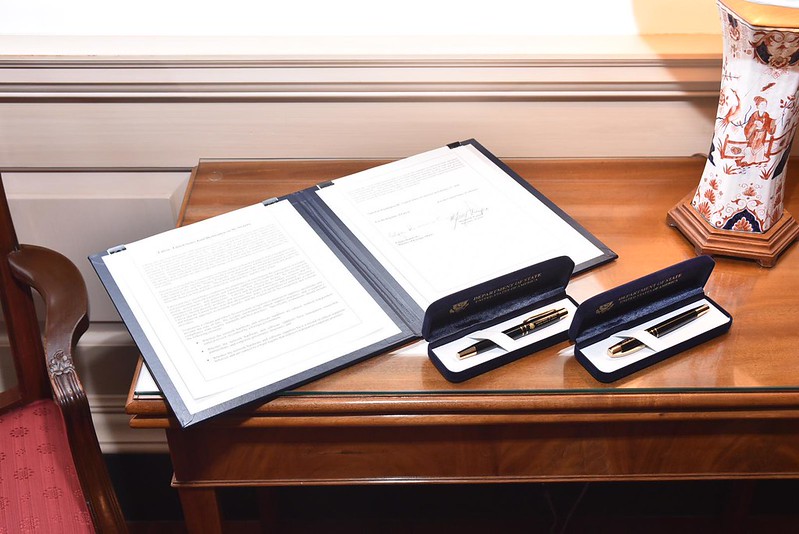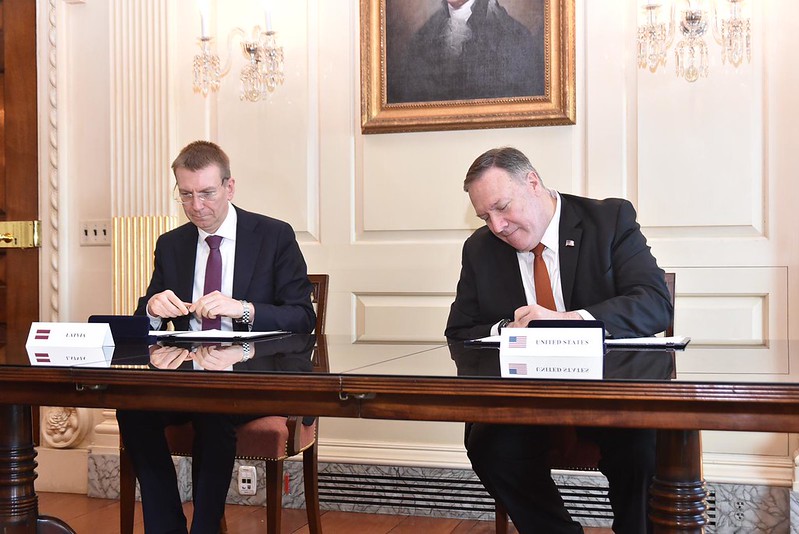The Latvian Minister of Foreign Affairs, Edgars Rinkēvičs, met with the United States Secretary of State, Mike Pompeo, in Washington D.C., for a signing ceremony.
"Taking into account the prime importance of secure fifth generation wireless communications networks, the United States and Latvia are declaring their desire to strengthen their cooperation in this field. Upon signing the declaration, Edgars Rinkēvičs noted that 5G will enable a vast array of new applications, including in the critical infrastructure. The Foreign Minister added that this cooperation will benefit our citizens and our economies. Increased amounts of data on 5G networks will further interconnect the economies of the world, including the United States and Latvia," said a statement from the Ministry of Foreign Affairs.
The pair also discussed various other topics and Rinkēvičs invited the U.S. Secretary of State to visit Latvia.

The text of the declaration can be read at the State Department website and is reproduced below. It does not specifically mention Huawei or any other company or country but does emphasize "a rigorous evaluation of suppliers should take into account the rule of law; the security environment; ethical supplier practices; and a supplier’s compliance with security standards and best practices" and "Whether the network hardware and software suppliers are subject, without independent judicial review, to control by a foreign government."
Taking into account that secure fifth generation wireless communications networks (5G) will be vital to both future prosperity and national security, the United States and Latvia declare their desire to strengthen our cooperation on 5G. 5G will enable a vast array of new applications, including the provision of critical services to the public, which will benefit our citizens and our economies. Increased amounts of data on 5G networks will further interconnect the economies of the world, including the United States and Latvia, and facilitate cross-border services and commerce. Protecting communications networks from disruption or manipulation and ensuring the privacy and individual liberties of the citizens of the United States and Latvia are vital to ensuring that our people are able to take advantage of the tremendous economic opportunities 5G will enable.
Therefore, the United States and Latvia welcome efforts such as the European Council “Conclusions on the significance of 5G to the European Economy and the need to mitigate security risks linked to 5G” and the “Prague Proposals”, as important steps toward developing a common approach to 5G network security. These proposals emphasize the need to develop and deploy 5G networks based on free and fair competition, transparency, and the rule of law.
The United States and Latvia emphasize the importance of encouraging the participation of reliable and trustworthy network hardware and software suppliers in 5G markets, taking into account risk profile assessments, and promoting frameworks that effectively protect 5G networks from unauthorized access and interference. The United States and Latvia further recognize that 5G suppliers should provide products and services that enable innovation and promote efficiency. The United States and Latvia note that all countries share a responsibility to undertake a careful and balanced approach to network security, and the evaluation of 5G component and software providers.
To promote a vibrant and robust 5G ecosystem, a rigorous evaluation of suppliers should take into account the rule of law; the security environment; ethical supplier practices; and a supplier’s compliance with security standards and best practices. Specifically, evaluations should include the following elements:
-
Whether the network hardware and software suppliers are subject, without independent judicial review, to control by a foreign government;
-
Whether the network hardware and software suppliers have transparent ownership, partnerships, and corporate governance structures; and
-
Whether the network hardware and software suppliers have a record of ethical corporate behavior and are subject to a legal regime that enforces transparent corporate practices.
The United States and Latvia believe that it is critical for countries to transition from untrusted network hardware and software suppliers in existing networks to trusted ones through regular life cycle replacements. Such efforts will not only improve national security, but also provide opportunities for private sector innovators to succeed under free and fair competition and benefit our respective digital economies. Further, the United States and Latvia support discussions on 5G security within the North Atlantic Treaty Organization.
























